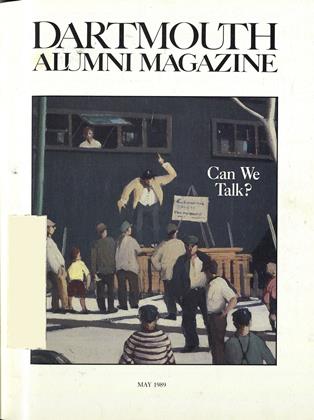Given the cacophony of voices on campus, Dartmouth does not lack for lively—and occasionally noisy—speech. Thanks in part to low-cost computer technology, undergraduate newspapers and magazines are burgeoning. The impetus ranges from literary expression to political passion to the need for cachet on the postgraduate resume.
The daily Dartmouth continues to attract the most journalistically minded students. But it's the "alternative" papers that have attracted the most recent notice.
The politically oriented newspapers tend to be the least long-lived, with the obvious exception of TheDartmouth Review. Its nationally based funding shows—financially, the Review sports the velvet jacket, and the others, the well-worn tweeds.
The radical newspaper Stet, though not created as a symmetrical opposite to the Review, can be equally overheated. Its creative process is egalitarian and disorderly. When asked whether Stet was run as an anarchy, one worker responded: "No, it's not that well organized." After four years as a radical forum for commentary on world, national, and campus issues, Stet is dormant this term, awaiting an infusion of funds and student energy.
The tabloid Common Sense occupies the political middle ground. It arose out of the shanty incidents in 1986, when seniors William Hanekamp and Brett Matthews, scorning the excesses of the left and right, saw a need for objective discussion of issues facing Dartmouth. Current editor Emily Hill '90 sees the paper's function changing because "things are no longer so polarized." Hill now considers Common Sense to be "the voice of the silent majority at Dartmouth."
Farther to the right is the Scribbler, begun in 1987 by Don Kempf '88 and Brian Fusonie '88 to give the College a responsible conservative view and to defend tradition. Recent topics include the liability crisis in America, a call for alumni giving to be a referendum on College affairs, and a defense of the fraternity system.
Two newspapers, Black Praxis and the Womyn's Re/View, serve special interests. Black Praxis, sponsored for 14 years by the AfroAmerican Society at Dartmouth, offers itself as the voice of the black community. The paper has news and advice about living at Dartmouth without submerging ethnicity.
The mission of the Womyn's Re/ View is feminism. The style is frank, emotional, bitter, unstructured, often slapdash, occasionally offensive, and not above a little cynical misanthropy: "Women who seek to be equal with men lack ambition."
Nonpolitical publications compose a much longer list:
Stonefence Review: a nine-year-old literary magazine. A recent endowment from the class of 1971 has enabled it to increase its size and sponsor readings and exhibitions on campus.
Unity: sponsored by the Interracial Concerns Committee, it celebrates cross-cultural expression by publishing short fiction. The first issue appeared in summer 1987. The advisor, Chaplain Gwendolyn King, hopes a second will soon follow.
Doug: a literary magazine founded recently to foster expression among students who are not arts or literature majors.
Jack O'Lantern: it's still alive, having been revived recently.
Aporia: a journal of undergraduate papers on philosophy.
World Outlook: a nonpartisan journal of international affairs. Articles are drawn from students, faculty, and alumni diplomats.
Gnosis: a magazine'containing he best academic papers by students for their classes.
Journal of the Dartmouth Scientific Society: promotes scientific literacy among liberal-arts students.
Dartmouth Business Forum: a magazine published by entrepreneurial and corporate hopefuls.
 View Full Issue
View Full Issue
More From This Issue
-
 Feature
FeatureWhen Dialogue Turns to Diatribe
May 1989 By Larry Martz '54 -
 Feature
FeatureDartmouth's Competitive Niche
May 1989 By Mahlon Apgar IV '62 -
 Feature
FeatureLet's Start a Genuine Discussion About Our College
May 1989 By George Munroe '43 -
 Feature
FeatureStudents in a "Goldfish Bowl" Rise to Debate
May 1989 By Ron Lepinskas '89 -
 Cover Story
Cover StoryCAN WE TALK?
May 1989 By Jay Heinrichs -
 Article
ArticleREVIEW LOSES SUIT
May 1989
Article
-
 Article
ArticleOUTING CLUB GETS USE OF NEW CABIN
May 1925 -
 Article
ArticleHis 10,000th Student
February 1962 -
 Article
ArticleIvy Stars
January 1996 -
 Article
ArticleTEAM MEETS "OLD MAN EXPERIENCE"
December 1934 By C. E. W. -
 Article
ArticleThe Faculty
JUNE 1966 By GEORGE O'CONNELL -
 Article
ArticleTHE COLLEGE AND THE RIVER
June, 1923 By JOHN KING LORD '68

